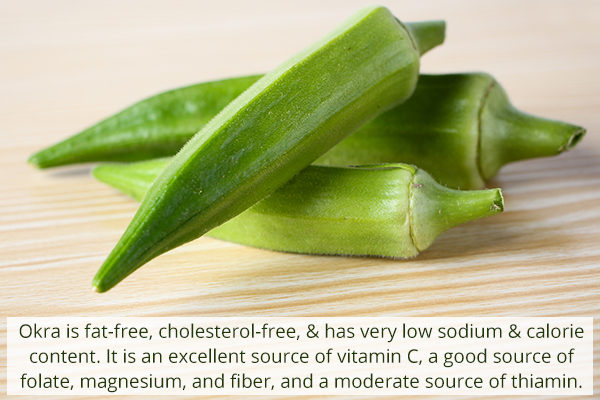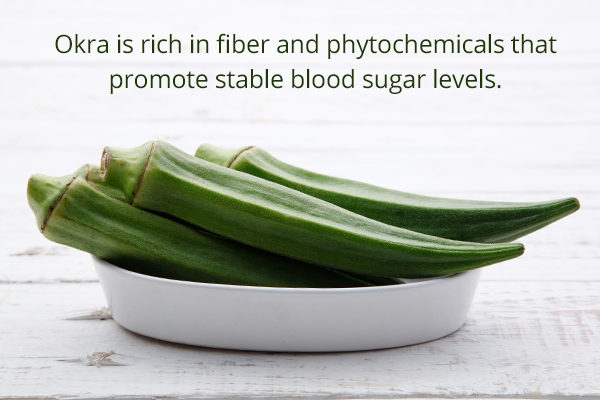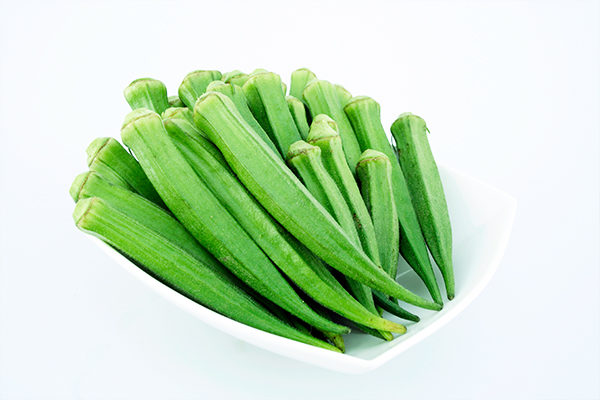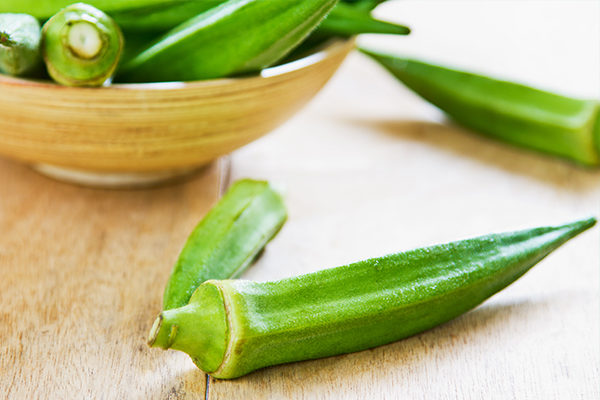In this article:
Okra is known by different names in many parts of the world – ladies’ fingers in England, gumbo in the United States, guino-gombo in Spain, guibeiro in Portugal, and bhindi in India. Abelmoschus esculentus is the scientific name of okra, and it is one of the most commonly known and utilized species of the family Malvaceae. (1)

Okra has high nutrition content and is an economic crop grown in tropical and subtropical areas. This perennial vegetable is resistant to extreme heat and drought conditions but susceptible to frosts, which can damage the pods.
It is a popular vegetable consumed all around the world. The various plant parts of this tropical vegetable, namely, the fresh leaves, flowers, stems, buds, pods, and seeds, have an array of uses.
Nutritional Content of Okra

Okra is a non-starchy vegetable and contains a number of essential vitamins and minerals. It is fat-free, cholesterol-free, very low in sodium, and low in calories. It is an excellent source of vitamin C, a good source of magnesium, fiber, and folate; and a moderate source of thiamin. (2)
The seeds contain proteins that have an amino acid composition similar to that of soybeans, making it a potential supplement to legume- or cereal-based diets.
One cup of raw okra contains:
- Water – 89.58 g
- Energy – 33 kcal
- Protein – 1.93 g
- Fat – 0.19 g
- Carbohydrate – 7.45 g
- Fiber – 3.2 g
Okra Varieties
There are mainly two types of okra:
- The long-duration variety is the most common form of okra cultivated over a long, hot growing season.
- The short-duration variety refers to dwarf varieties that were created later, which have a short stature, mature quickly, and bear small fruits.
Other popular okra varieties include Red Burgundy, Emerald, Louisiana Green Velvet, Clemson Spineless, Dwarf Green Long Pod, Hastings Improved Perkins, Annie Oakley, UGA Red, Lee, Chinese Okra, and Purple Okra.
Advantages of Including Okra in the Diet
Here are a few suggested health benefits of consuming okra:
1. May reduce blood sugar levels

Diabetes mellitus is a complex metabolic disorder that can lead to many complications. This disease condition is prevalent worldwide.
Several studies have explored okra’s effect on blood glucose levels. Okra is rich in fiber and phytochemicals, which promote stable blood sugars. Some studies suggested that okra extracts can decrease blood glucose and cholesterol levels. (3)(4)(5)
Several studies have shown the benefits of okra in promoting stable blood sugar levels. Incorporating okra in the diet may contribute to improved glucose control.
2. May contribute to a healthy pregnancy
Like all dark green vegetables, okra is a good source of folate, which is an important nutrient for pregnant women. Adequate folate intake promotes healthy fetal development and prevents neural tube defects such as spina bifida. It may also prevent early miscarriage. (1)(6)
Incorporating okra into a balanced diet is an excellent way of taking in folate, which is vital for a healthy pregnancy.
Other Benefits of Okra
In addition to the benefits of okra already mentioned, here are additional proclaimed benefits of including okra in your diet. However, these benefits still require additional research.
1. May reduce cholesterol levels
Animal studies have reported that okra extracts may help reduce cholesterol levels, although further human studies are needed to reach conclusions. (7)(8)(9) Okra is naturally saturated fat-free and cholesterol-free.
2. May maintain healthy bones
Balanced eating is essential for bone health. Multiple nutrients contribute to bone mineralization, including calcium, vitamin D, phosphorus, magnesium, and protein.
A serving of okra provides 6% of the daily value of calcium and 16% of the daily value of magnesium. Thus, okra, in addition to balanced eating and weight-bearing exercises, may contribute to bone health. (10)
3. May help maintain healthy skin
Okra protein and oil extracts have been added to various skin care products with beneficial results.
One study found that an alcohol-based hand rub that contained okra polysaccharide caused lesser skin dryness than traditional hand cleansing products. (11) Another study suggested that the flavonoids in okra can potentially act as UVB protective agents and, therefore, may be used in topical herbal sunscreens. (12)
A third study evaluated okra oil extraction and demonstrated its use in making soaps, quick-drying oils, and emulsifiers. (13)
ALSO READ:
4. May fight fatigue
Okra pods are rich in flavonoids, polysaccharides, and polyphenols that have strong antioxidant and antifatigue effects. (14)(15) However, fatigue is a complex condition, and additional research is necessary to establish the link between consuming okra and fatigue.
5. May protect against liver diseases
Animal studies have revealed that okra seed oil consumption could effectively protect against liver damage due to its potent antioxidant property. (16)(17)
6. May help in weight management
One study found that okra polysaccharide lowered body weight and glucose levels, improved glucose tolerance, and decreased serum total cholesterol levels in mice. (18)
7. May aid in digestion
Okra is a high-fiber food and may contribute to a healthy digestive tract. Adequate fiber adds bulk to food and helps move food through the digestive tract. Thus, consuming this vegetable may reduce constipation.
A study found that okra’s mucilaginous properties may protect the gut against H. pylori, the bacteria that cause ulcers. (19)
ALSO READ: Foods to Improve Your Digestion
8. May boost immunity
Studies have explored the relationship between okra and immunity. A study found that okra polysaccharides may improve immune response in mice. (20)
9. May help fight cancer
Several in-vitro studies have highlighted the antitumor effects of okra polysaccharides on cancer cells. Further studies are still needed to establish its efficacy in fighting cancer cells. (21)(22)
How to Consume Okra
Fresh unripe okra pods and okra leaves are used in a variety of cuisines and can be enjoyed fried, boiled, pickled, or stir-fried whole. Here’s how you can include different parts of the plant in your diet:
- This mucilaginous plant is commonly used as a thickening agent in soups and stews.
- Young leaves are frequently used in salads and are prepared similarly to spinach.
- Seeds can be pressed for oil or roasted and used as a coffee substitute.
Okra for Industrial Use

Okra has attributes that allow it to be used for other purposes:
- Okra mucilage has a composition similar to that of polysaccharides and is being developed as an option for biodegradable food packaging. (23)
- Okra is also used as foliage for biomass and construction material.
- Okra handicrafts are also available.
- Dried okra stems may be utilized as paper pulp or a fuel source.
Selection and Storage
When buying or harvesting okra, choose brightly colored green pods no more than 4 inches in length. Avoid dull, bruised, soft, or blemished pods. Okra should be firm and snaps easily. Older pods are tough with dark tops and are more sticky or gooey.
Follow these tips when storing okra:
- Store okra in the refrigerator in a paper bag or wrapped in a paper towel in a perforated plastic bag. The okra will be good for 2–3 days in the crisp section.
- If storing for later use, trim the ends, blanch for 3–4 minutes, and then quickly cool in ice water. Dry and freeze in a Ziploc bag.
Young Versus Mature Okra: Which Is Better?
Okra pods must be harvested young if they are to be eaten. The ideal harvest time is within 3–5 days of blooming for optimal quality. The pods mature quickly and as they age, they become tougher, more fibrous, and less acceptable to eat.
Okra Allergy
An okra allergy can be triggered by consuming or handling the vegetable, and it is typically marked by itchiness, hives, tingling around or in the mouth, difficulty breathing, and nasal congestion. People with an allergy to okra may also have reactions to althea tea and cottonseed oil and meal.
Drug Interactions
It is advisable for people taking metformin to be aware of its interaction with okra. A study revealed that an okra solution decreased the absorption of metformin and, thus, reduced the medication’s effectiveness. It is advised to eat okra in moderate amounts. (24)
Most-Asked Questions About Okra

Is okra good for blood pressure?
A nutrient-rich diet helps in lowering blood pressure. Okra is a moderate source of magnesium, which helps maintain and regulate blood pressure.
Can okra be eaten raw?
The entire okra plant is edible. Okra leaves are routinely eaten raw in salads similar to spinach, but okra is typically enjoyed cooked.
What does okra taste like?
Okra has a mild flavor that is slightly grassy. It is often compared to eggplant or green beans. It easily takes on the flavor of spices and ingredients prepared along with it.
How can okra be cooked such that it will not be too slimy?
Always choose fresh, brightly colored okra. Using high heat when cooking may decrease the slimy texture. Dry the okra completely before cooking.
Other tips to decrease the slimy texture include limiting cuts to the vegetable, leaving on the top, precooking it at a high temperature, cutting okra while frozen, or soaking it in vinegar for 30 minutes before use.
Will drinking okra water make me lose weight and improve my blood sugar level?
It has become common among people to drink okra water. Okra pods are nutrient-dense, but there is no scientific evidence that drinking okra water will benefit your health. If you would like to try, soak okra overnight in water and drink it in the morning after removing the okra.
Final Word
Okra is high in nutrients while being low in calories, fat, cholesterol, and sodium, making it a healthy addition to your daily diet. Okra is a versatile crop with multiple uses of its leaves, buds, flowers, and pods. For long, it has been used as a vegetable and a source of antioxidants as well. (25)
But a single food cannot improve your health by itself, no matter how nutritious it may be. The best way to derive the goodness of okra is to consume it as part of an overall healthy, well-balanced diet.
- Was this article helpful?
- YES, THANKS!NOT REALLY


